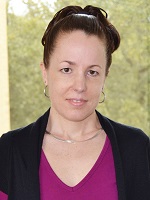Candidate for AMTE Treasurer
Sarah E. Quebec Fuentes
Texas Christian University
Associate Professor of Mathematics Education

Participation in AMTE and/or AMTE Affiliates(s)
I have been a member of the Association of Mathematics Teacher Educators since 2011. Currently, I serve on the Connections Newsletter Editorial Panel (2018-2021). For the 2012 Annual Conference in Fort Worth, Texas, I was a member of the Local Arrangements Committee.
I have also been a member of the AMTE affiliate, the Association of Mathematics Teacher Educators in Texas (AMTE-TX), since 2010. For AMTE-TX, I currently serve as the Past-President (2018-2019). In the past, I served in the following roles:
- President (2016 – 2018)
- Steering/Program Committee Co-Chair for Fall Conference (2016 – 2018)
- President-Elect (2015 – 2016)
- Program Co-Chair for Fall Conference (2014 – 2015)
- Treasurer (2011 – 2014)
- Member of the Registration Committee for the Fall Conference (2013)
Qualifications for the Position
My roles and responsibilities as treasurer for AMTE-TX closely parallel those described for the position of AMTE treasurer. As the treasurer for AMTE-TX, I was responsible for establishing and maintaining a local bank account, receiving membership fees, maintaining a membership database, managing conference registration fees via PayPal, dispersing/reimbursing for all expenditures, keeping the budget electronically, participating in board meetings, and preparing budget reports for the annual business meeting. Further, during my tenure as treasurer, the leadership team worked collaboratively to increase membership; these efforts resulted in a 39% increase in membership.
Three Goals AMTE should make a Priority
The three goals that AMTE should consider as a priority are advocacy, re-professionalization of the field, and linking the research and practice communities. These three goals reflect the mission of the organization and are evident in its current work. Although each of the goals has unique characteristics, they are also related to each other. In particular, the continued dissemination and implementation of the AMTE Standards for Preparing Teachers of Mathematics, with the prioritization of equity integrated throughout the document, will support each of the goals.
Recently, teacher education programs have been scrutinized. As mathematics teacher educators, we must be advocates for teacher education in general and mathematics teacher education in particular. To do so, we need to educate ourselves on the issues at hand and contribute our expertise to the conversation. Otherwise, decisions will be made for us, perhaps at our expense. At the American Association of Colleges of Education (AACTE) leadership academy (2016), Dr. Rodrick Lucero, former Vice President of Engagement and Support, spoke to the importance of advocacy. He argued that not only do we need to be advocates for teacher education, but we must also educate our preservice teachers to be ambassadors for teacher education as well as K-12 education.
Similarly, mathematics teachers in the field need to be empowered to make decisions. In the current political climate in education, teachers in some K-12 schools have limited opportunities to make instructional decisions, reflect on their practice, and develop professionally. These teachers are expected to strictly follow scripted curriculum and attend mandated professional development leading to the deskilling or de-professionalization of the field. The re-professionalization of teachers involves mathematics teacher educators supporting teachers in assessing and making decisions to meet their needs as well as the needs of all of their students. Purposefully designed opportunities for professional growth must connect to teachers’ practice and involve long-term engagement such as learning through action research and the use of educative curriculum materials.
In its report, Linking Research & Practice, the National Council of Teachers of Mathematics (NCTM) (2010) encourages developing the connection between research and practice: “[T]he research and practice communities have much to contribute to each other’s work; it is only through working in tandem that we can make a concerted effort to improve mathematics teaching and learning in the United States” (p. 6). The work of mathematics teacher educators must cross multiple communities (e.g., universities and K-12 schools), which have different cultures and norms. Learning how to effectively navigate these communities and collaborate with multiple stakeholders (e.g., inservice teachers, preservice teachers, students, and parents) is critical for making mathematics teacher education researchers’ work relevant.
